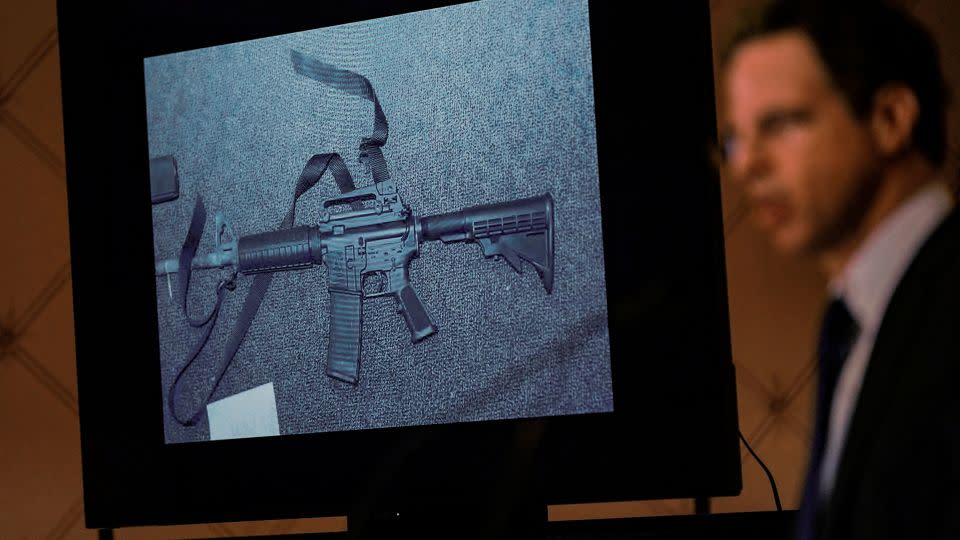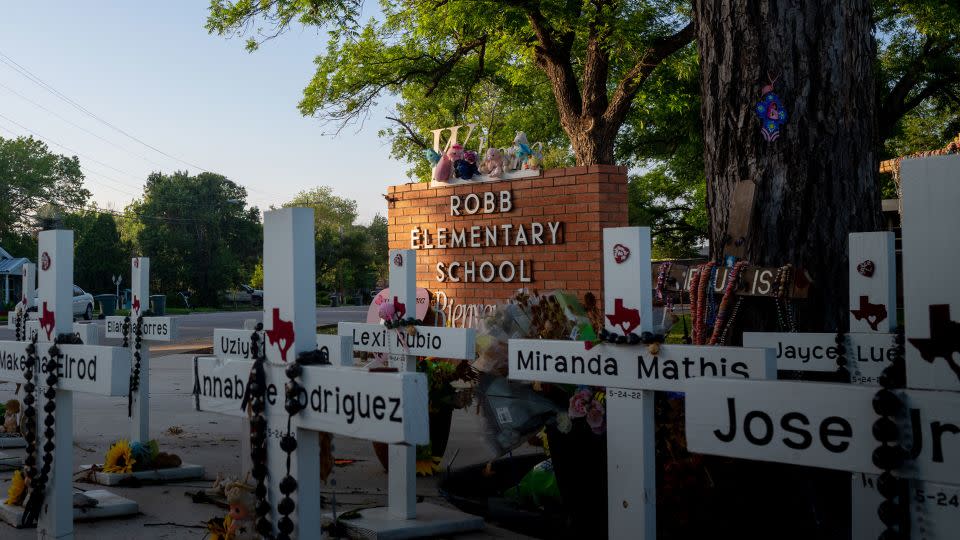Prosecuting parents and suing social media, gun manufacturers in a new era of mass shooting accountability
A version of this story appeared in CNN’s What Matters newsletter. To get it in your inbox, sign up for free here.
The search for accountability in the unending era of American mass shootings is turning to novel legal tactics against the parents who raise shooters, the gun manufacturers that appeal to them and the social media platforms where they might learn radical behavior.
Suing gun manufacturers. This week, Everytown Law and the city of Chicago, making use of a new firearm responsibility law in Illinois, filed a lawsuit against the manufacturer Glock arguing that Glock is helping spread illegal machine guns. They argue that Glock is responsible because its handguns can easily be refashioned into automatic weapons using a so-called “Glock switch,” even though it is not manufactured by the company.
RELATED: CNN Investigates filed this report in 2022 about a device that can turn a semi-automatic weapon into a machine gun.
Prosecuting parents. Twin guilty verdicts for the parents of Ethan Crumbley suggest juries are willing to look beyond a mass shooter in placing blame. Crumbley is the Michigan teen who in 2021 killed four fellow students the same day that his mother and father were warned by a counselor about his behavior.
The facts in that case may have been particularly damning in terms of how they implicated the parents for negligence. But the precedent could be used by prosecutors in cases that do not make national headlines.
“We’re living in a new world now, and that new world is a prosecutor saying, ‘If we’re not going to have legislation, if we’re not going to have significant protections, we’re going to take it upon ourselves to use the law in a way that gets accountability to everyone and anyone who could have potentially been involved,’” CNN legal analyst Joey Jackson told CNN’s Erin Burnett last week.
Karen McDonald, the Oakland County prosecutor who oversaw the Crumbley parent prosecutions, told CNN’s Jean Casarez she did not know when she brought the charges that the case would be the first of its kind, but she was always intent on finding a way to prosecute the parents.
“I said, we have to find that – but I know it exists, because I know that our set of laws are based on what’s right and wrong. And I know that we have a duty to other children and other people to protect them,” McDonald said.
The facts were particularly bad for the parents in this case, according to Stephen Gutowski, a CNN analyst and founder of The Reload, a website the covers the gun rights and safety debate.
“I think that the success of it by itself is going to encourage more prosecutors to try this,” Gutowski told me by phone. He also pointed me to one argument complicating the prosecutions in this case: that Ethan Crumbley faced charges as an adult, but his parents faced charges as parents. But that distinction may not matter to many people who want justice for the four killed students.
Testing immunity for gun manufacturers, social media companies
While prosecutors are inventing new avenues of prosecution based on old laws, activist groups led by Everytown for Gun Safety have launched a wave of new lawsuits around the country.
These civil cases are being filed in spite of a 2005 federal law that gives gun manufacturers immunity from lawsuits “resulting from the misuse of their products by others.”
Supporters say they have crafted the lawsuits to respect that law while still seeking accountability. They were buoyed by the $73 million settlement in 2022 of a lawsuit brought by the families of children and adults killed in 2012 at Sandy Hook Elementary School against the bankrupt gun manufacturer Remington and its insurers. The suit argued that Remington contributed to the killing with its marketing strategy.

The fact that the US Supreme Court allowed the lawsuit to proceed suggests the immunity of manufacturers is not ironclad. A bonus for gun safety activists is the message the settlement sends to insurers and bankers behind manufacturers.
Now, Everytown is partnering with victims and survivors across the country.
“Our view of gun violence in the country requires accountability at multiple levels,” Nick Suplina, Everytown’s senior vice president for law and policy, told me in a phone call.
In his view, that includes the need for accountability from lawmakers who refuse to pass new gun laws and lobbyists who fight them. “Recently, we’ve really expanded the need to hold others accountable for their role in gun violence in the country,” Suplina said, adding that Everytown now has expanded its effort to bring lawsuits.
Lawsuits all over the map
► Social media companies – In Buffalo, New York, where a racist gunman killed 10 people at a grocery store in 2022, lawsuits on behalf of victims’ families and survivors target social media companies.
A judge ruled this week that the lawsuits can proceed, setting up a challenge to the portion of US telecom law known as “Section 230,” by which social media companies have enjoyed immunity from responsibility for what’s posted on their sites.
The suits claim social media companies – like Meta, Alphabet, Reddit and 4chan – ”profit from the racist, antisemitic, and violent material displayed on their platforms to maximize user engagement,” including the time then 18-year-old Payton Gendron spent on their platforms viewing that material.
The suits also target the manufacturer of a gun lock, a gun store and the manufacturer of body armor used by Gendron.
► Gun manufacturers – In Uvalde, Texas, lawsuits allege that firearm manufacturer Daniel Defense is partially responsible for the deadly shooting at Robb Elementary School in 2022 because the company’s marketing targeted young, disaffected men and encouraged them to use weapons in a military fashion.
The lawsuits also target the gun store that sold the murder weapon and the officers who failed to enter the elementary school as the shooting occurred.

► Gun shops - The lawsuit against a gun shop that supplied a shooter who killed five coworkers in Louisville, Kentucky, in 2023, alleges the gun store “upsold” the shooter, directing him toward deadlier gear.
It remains to be seen if these lawsuits will build on the success of the Sandy Hook families’ settlement with Remington.
“They’ve adopted this tactic, but it hasn’t so far born out into success,” Gutowski said.
There’s no lack of trying.
New state laws tested
California has passed multiple gun-related laws that have a mixed record so far in court.
Giving people the ability to sue manufacturers of “abnormally dangerous” firearms has so far been blocked. An effort to ban guns in most public places is currently blocked. Restrictions that prohibit defendants awaiting trial from possessing guns have been allowed to proceed.
The law has not kept up with low-tech, after-market ways to alter or even build so-called “ghost guns” with kits bought online and assembled at home. The Biden administration had sought to regulate ghost guns, but those efforts were declared unlawful by a federal appeals court. The administration last month asked the Supreme Court to weigh in.
Meanwhile, a Michigan teen is suing a major ghost gun kit seller after he was accidentally shot in 2021 by a friend who had bought the kit despite being under age.
The Supreme Court is already considering the action taken by former President Donald Trump, and continued by President Joe Biden, to ban “bump stocks,” another after-market product that makes rifles more deadly. Conservative justices were skeptical of the bump stocks ban in oral arguments last month.
This headline and story have been updated.
For more CNN news and newsletters create an account at CNN.com

